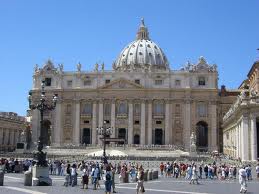
This article was last updated on April 16, 2022
Canada: ![]() Oye! Times readers Get FREE $30 to spend on Amazon, Walmart…
Oye! Times readers Get FREE $30 to spend on Amazon, Walmart…
USA: ![]() Oye! Times readers Get FREE $30 to spend on Amazon, Walmart…
Oye! Times readers Get FREE $30 to spend on Amazon, Walmart…
 Vatican City – Money laundering at the Vatican bank and the plot to kill Pope Benedict XVI. Another Dan Brown novel?
Vatican City – Money laundering at the Vatican bank and the plot to kill Pope Benedict XVI. Another Dan Brown novel? The Vatican is being plagued by the scandalous reports of alleged financial mismanagement, political infighting and gossip about who might be the next pope.
Come February 18, Benedict is set to crown 22 new cardinals — the princes of the church who will elect his successor when the 84-year-old Benedict is showing signs of slowing down.
2012 is proving to be a challenge for this pontiff. In June 2012, a European commission will decide whether the Vatican has abided by tough international anti-money laundering and anti-terror finance laws by joining the so-called "white list" of countries that share financial information. The Vatican, however, has a reputation as a scandal-plagued, secrecy-obsessed tax haven.
Almost lost in the shuffle is that the Vatican in recent weeks has done more to come into compliance with international financial norms than perhaps at any time in its history. It has ratified three major U.N. conventions and rewritten its law on money laundering, all to improve the image of The Vatican bank, or as they call it the Institute for Religious Works or IOR.
This past Friday, a bombshell hit when a confidential letter was leaked last month from a top Vatican official, concerning how an Italian cardinal visiting China had spoken about a presumed plot to kill Benedict this year. The document also said the pontiff was grooming Milan’s archbishop as his successor.
Veteran Vatican correspondent Andrea Tornielli said the reports showed a clear power struggle is under way inside the Vatican, "the outcome of which is uncertain yet devastating," concerning both the fate of the pope’s deputy, Secretary of State Cardinal Tarcisio Bertone, and any future conclave to elect the next pope.
Another Vatican commentator who has been highly critical of Bertone’s leadership, Sandro Magister, put it this way in a recent column: "The secretary of state is increasingly alone, in a curia he does not govern and with a pope he does not help."
At present, the Vatican Bank, or the IOR, is outside the Italian central bank’s regulatory grasp.
Some of the leaked documents have carried the processing stamp of the Vatican secretariat of state, implying an internal leak. Only this year, the Vatican has taken remarkable steps in the past year to be more transparent in its financial dealings and co-operative with international requests for financial data.
The Italian media continue to search out the taste of corruption in the awarding of Vatican contracts. The leading newspaper Corriere della Sera even suggested that a monsignor with links to the Vatican’s Congregation for the Causes of Saints had lost €1.6 million by investing with a Bernard Madoff-like schemer.
Corriere identified the source of that story as Luca Tescaroli, the Rome prosecutor who has pursued a 30-year-old case concerning the worst scandal at the IOR: the death of Roberto Calvi, the Catholic banker who helped managed the Vatican’s investments and was found hanging from London’s Black friars Bridge in 1982.
Calvi headed the Banco Ambrosiano, which collapsed in 1982 after the disappearance of $1.3 billion in loans made to dummy companies in Latin America. The Vatican had provided letters of credit for the loans.
Calvi was found hanging a short time later, his pockets loaded with bricks and cash. After an initial ruling of suicide, murder charges were filed against five people, including a major Mafia figure, but all were acquitted. At that time, while denying wrongdoing, the Vatican Bank paid $250 million to Ambrosiano’s creditors. The case remains unresolved.
Separately, the Vatican bank president and director general remain under investigation by Rome prosecutors who allege they broke Italian law in 2010 by trying to transfer money from two Vatican bank accounts without identifying the sender or recipient. The Vatican says the matter was the result of a misunderstanding.
The Vatican’s lawyer called for the media to report on the "undignified" demise of the case and not just on claims of corruption.
"That inflammatory allegations against the Holy See and the IOR are easily disseminated and make good fodder for conspiracy theorists cannot be doubted," the lawyer said in a statement.
Paul Collins, author of Mack Dunstan’s Inferno/ Mystery of Everyman’s Way
To contact him, go to: http://www.facebook.com/authorpaulcollins
You can publish this article on your website as long as you provide a link back to this page.

Be the first to comment